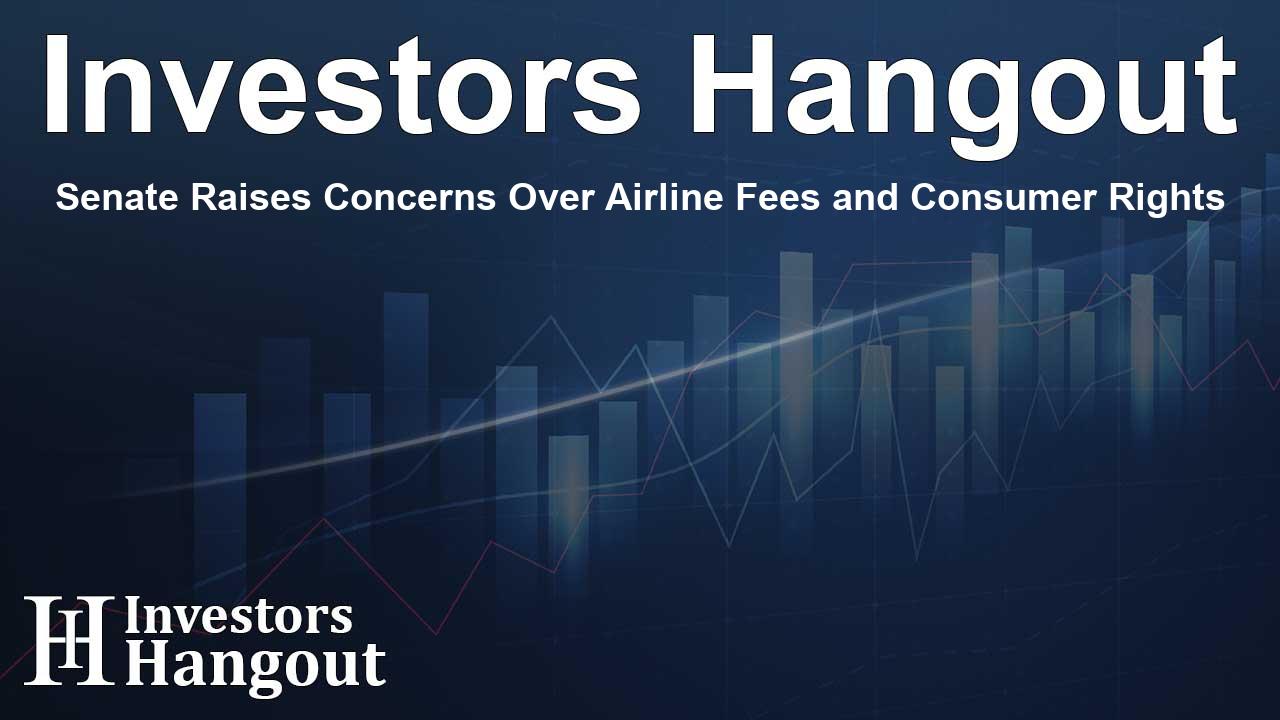Senate Raises Concerns Over Airline Fees and Consumer Rights

Senate Panel's Growing Concerns Over Airline Fees
Recently, a prominent U.S. Senate panel has expressed its growing concern regarding the escalating fees charged by airlines for seat assignments and luggage. These rising costs have prompted the committee to invite executives from major air carriers to appear before them for discussion.
Citing Revenue Surges in the Airline Industry
Leading the charge, Senator Richard Blumenthal, chair of the Permanent Subcommittee on Investigations, has scheduled a significant hearing titled "The Sky’s the Limit -- New Revelations About Airline Fees". In this hearing, airline executives from major companies such as American Airlines (NASDAQ: AAL), United Airlines, Delta Air Lines (NYSE: DAL), Spirit Airlines (OTC: SAVEQ), and Frontier will be called to provide insights.
According to a report released by Blumenthal’s committee, a staggering $12.4 billion in revenue was generated from seat fees alone by these five airlines between 2018 and 2023. Notably, last year marked a milestone for United Airlines, which reported receiving $1.3 billion from seat fees, outpacing the $1.2 billion earned from checked bag fees for the first time.
Investigations Uncover Fee Strategies
Over the past year, the committee has conducted a thorough investigation into airline practices, revealing that airlines are increasingly implementing advanced algorithms for fee structure determination. These algorithms allow companies to tailor pricing based on customer data, raising questions about fairness and transparency in the industry.
Moreover, the inquiry highlighted that some airlines might be sidestepping federal transportation excise taxes by categorizing certain charges as nontaxable fees. This tactic could significantly affect government revenue and consumer rights, leading Congress to consider rigorous oversight.
Incentive Practices Among Low-Cost Carriers
The findings also drew attention to the practices of ultra-low-cost carriers such as Frontier and Spirit. The committee discovered that these airlines allocated $26 million to gate agents and other personnel over a one-year period to enforce payment of bag fees and monitor oversized items.
Notably, Frontier has been reported to incentivize its gate agents with commissions of up to $10 for each bag a passenger is compelled to check at the gate. In response to concerns raised, Frontier explained that this commission structure is aimed at ensuring compliance with baggage size requirements, ensuring fair treatment for all customers.
Industry Responses to Rising Scrutiny
The airline industry association, Airlines for America, defended the practice of optional fees, asserting that average domestic round-trip fares, including these fees, were actually 14% lower in real terms in 2023 when compared to 2010. Meanwhile, Delta Airlines emphasized its dedication to offering a variety of fare choices tailored to meet diverse customer needs.
Seeking Greater Transparency and Accountability
Blumenthal has advocated for Congress to mandate that airlines provide clearer and more detailed disclosures regarding fee structures. He also urged the Department of Transportation (USDOT) to explore potential abuses linked to incentive-based fee collection practices.
Historically, the airline industry has fought against regulations meant to bring transparency, including a recent legal challenge against USDOT's directive requiring upfront disclosure of airline fees. Furthermore, airline CEOs successfully resisted bipartisan legislative efforts in 2018 to implement "reasonable and proportional" baggage and change fees.
Frequently Asked Questions
What are the main concerns the Senate panel raised?
The Senate panel primarily criticized the rising airline fees for seat assignments and luggage, questioning their fairness and transparency.
When is the hearing scheduled and who will testify?
The hearing is scheduled for December 4, featuring executives from major airlines such as American Airlines, United Airlines, and Delta Air Lines.
How much revenue did airlines earn from seat fees?
According to reports, the five major airlines collectively earned $12.4 billion from seat fees between 2018 and 2023.
What did the investigation reveal about fee-setting practices?
The investigation found that airlines increasingly utilize algorithms to set fees based on customer data, leading to concerns over equitable pricing.
What actions did Blumenthal propose regarding fee disclosures?
Blumenthal suggested that Congress require airlines to provide more comprehensive fee disclosures and called for investigations into incentive-based fee collection by the USDOT.
About Investors Hangout
Investors Hangout is a leading online stock forum for financial discussion and learning, offering a wide range of free tools and resources. It draws in traders of all levels, who exchange market knowledge, investigate trading tactics, and keep an eye on industry developments in real time. Featuring financial articles, stock message boards, quotes, charts, company profiles, and live news updates. Through cooperative learning and a wealth of informational resources, it helps users from novices creating their first portfolios to experts honing their techniques. Join Investors Hangout today: https://investorshangout.com/
Disclaimer: The content of this article is solely for general informational purposes only; it does not represent legal, financial, or investment advice. Investors Hangout does not offer financial advice; the author is not a licensed financial advisor. Consult a qualified advisor before making any financial or investment decisions based on this article. The author's interpretation of publicly available data shapes the opinions presented here; as a result, they should not be taken as advice to purchase, sell, or hold any securities mentioned or any other investments. The author does not guarantee the accuracy, completeness, or timeliness of any material, providing it "as is." Information and market conditions may change; past performance is not indicative of future outcomes. If any of the material offered here is inaccurate, please contact us for corrections.